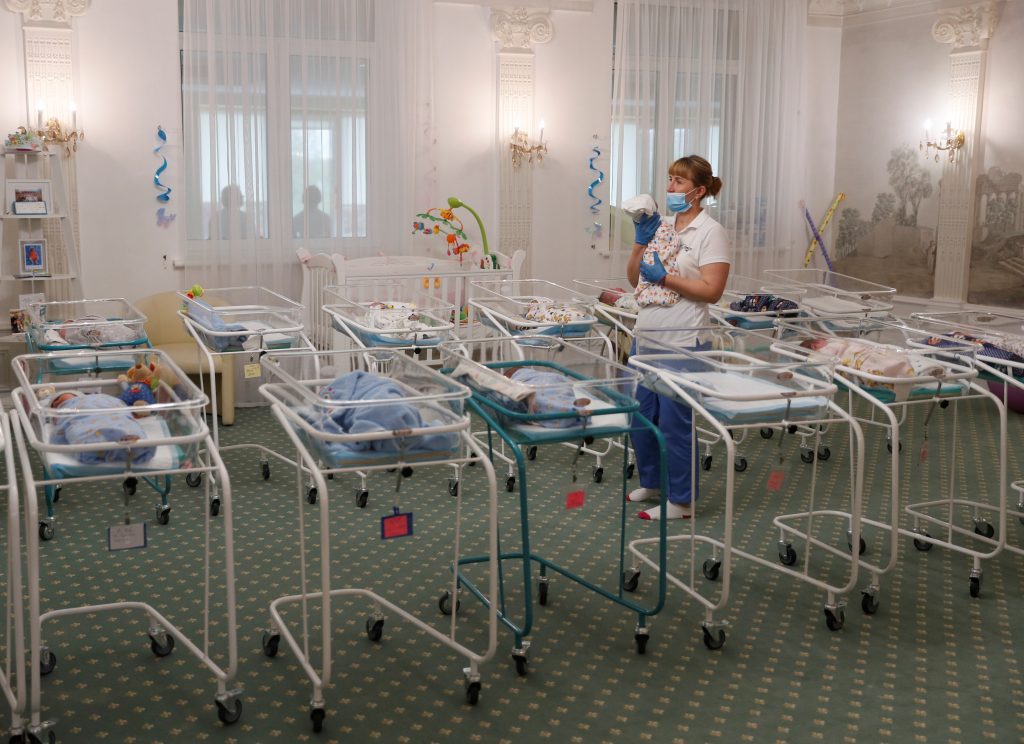For months now the nonstop, wall-to-wall coverage of the global catastrophe of the pandemic has filled our TV screens with images of suffering, from patients dying surrounded by masked strangers, to owners of failing small businesses crying over the crushing of their American Dream.
One image that has affected me especially is that of more than 100 newborn surrogate babies parked side by side in bassinets in a hotel in Kiev, waiting indefinitely for the parents that commissioned their existence but are unable to travel to fetch them.
For me it was a sad reminder of the months our adopted daughter spent in a Chinese orphanage while her father and I longed to fly to her rescue. Living in a cold bassinet under the indifferent attention of overworked nannies, after being unnaturally parted from her birth mother, is no way for a child to spend the first months of her life.
Our daughter’s plight was the result of unjust laws and morally problematic cultural attitudes — namely, China’s brutal population control policies and a culture that values sons over daughters.
The plight of the babies in Kiev likewise has similar social roots. In their case, a Wild West-style sense of lawlessness has created a thriving, unethical, commercial child-producing industry in Ukraine, an industry built on a growing acceptance of the concept of a child as a bespoke commodity that can be artificially created by rich Westerners and implanted in rented women. In both cases, the babies suffer by being torn away from the woman who nurtured them for months.
While the children in Kiev will eventually, in most cases, be claimed by their biological parents and recover from their time in the hotel-turned-orphanage, this type of artificial reproduction exposes their surrogate mothers to grave dangers.
One is the moral menace of being exploited in a type of human trafficking, in which a woman’s person is reduced to a uterus that can be rented, her long and arduous pregnancy a service, and the child in her womb a product. These women are, in effect, being abused as breeders: real-life versions of the red-robed “handmaids” that social progressives use to heap abuse on what they fear is a tyrannical “patriarchy.”
In Ukraine, several thousand impoverished women a year are paid an average of $12,000 to risk their emotional and physical health — as well as their lives — to give a rich couple their genetically related child or children.
Since the surrogate mother is completely biologically unrelated to the fetus, she runs an even higher risk of grave complications than women who’ve undergone conventional IVF, due to immunologic interactions: more cesareans, pre-eclampsia, protracted labor, even death.
The intended parents do not, of course, make themselves responsible for the other children these women leave behind. Surrogate moms are often implanted with multiple embryos and then undergo “reduction” or partial abortion, to one embryo or twins, at the will of the parents. Twin surrogate pregnancies are even more physically dangerous for the mother.
Besides physical risk, there is great emotional hazard as well. In pregnancy a woman becomes acutely attuned to the child shifting, kicking, and hiccupping inside her. He or she becomes her constant companion and the object of her concern through the marvel of biology. The birth itself releases hormones meant to bond the mother to her child and causes her breasts to swell with the baby’s sustenance.
The loss of the child, though planned, is often experienced as a great grief and trauma, even leading to post-traumatic stress disorder. Achieving pre-surrogacy mental health may be difficult or impossible for some women.
Looking at the images of the stranded babies in Kiev, I am distressed by their temporary orphan-hood, so much like my own daughter’s months in her orphanage. Like my daughter and her orphanage mates, every baby in a bassinet in the hotel in Kiev has a mother that is recovering from the birth of her child, a recovery complicated by unnatural separation and perhaps great sorrow.
But that is where the similarities between adoption and surrogacy end. Adoption is a solution to the already existing problem of an orphan child, whose bonds to her natural and best guardians (her biological parents) have been sundered. In surrogacy, the very act of artificially conceiving the child in a rented surrogate womb is the sharp sword that cuts through every beneficial tie that natural conception and parenting provide.
Lest we be led to think that surrogacy is strictly a problem in impoverished countries, it was during the darkest days of the pandemic that New York state quietly legalized commercial surrogacy. Now poor women in 47 states can be hired out in this way, by people with considerable means.
At home or abroad, surrogacy is the most unethical practice (so far) of a reproductive-industrial complex that has utterly monetized and debased one of the most intimate and meaningful aspects of human existence.
Like other artificial reproductive technologies, it has the single aim of manufacturing a commodity for people with money, from the sweat, pain, and tears of women without.

